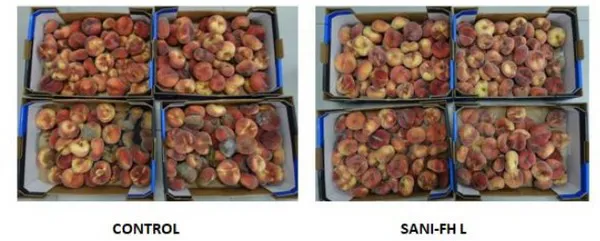The stone fruit season has already started and, like every year, the loss of turnover due to rot and/or complaints from customers is one of the biggest concerns for traders. Another aspect worth noting is the growing interest from consumers in healthy products and the reduction of food waste.
"Stone fruit, unlike many other fruits, can be eaten with the skin, which means that extreme precautions must be taken during treatment, both in the orchard and in the warehouse. The EU has issued all kinds of regulations and guidelines for this," says Javier Biel, manager of the Spanish firm Sanifruit.
Stone fruit growers are already working on the switch to 'waste-free' cultivation, aiming to set a good example of social and environmental responsibility. "Now the rest of the chain, from warehouses to transport, should follow that move, as it doesn't seem very logical for fruit in the orchard to be certified and treated with products that leave no residue and, subsequently, to have the rest of the chain using chemical products, even if they are legally allowed to do so. This is in conflict with the idea of a healthy and environmentally-friendly product," says Javier Biel.
“At Sanifruit, we offer SANI FH-L, our solution for stone fruit treatment in the warehouse, to packing stations and sales companies. It is a post-harvest treatment that helps reduce losses by rotting, slows down weight loss and keeps the fruit fresh. Good results were achieved in 2019, according to tests carried out in the laboratory and in handling facilities by clients who already shipped their fruit after treating it with our solutions. In those cases, the reduction in the rot rate was comparable to that achieved by chemical treatments."

"During an 11 day cold storage period at 2 °C, SANI FH-L reduces fruit rottenness by 4.2% after 7 days and by 6.1% after 11 days, compared to fruit stored without our treatment. During a 3-day storage period at room temperature, the rot rate decreases by 6.2%," says Javier.
SANI FH-L also does a good job in preventing fruit weight loss. Although this aspect is not the main concern for packing stations and sales companies, there is also some profit to be made here. Sanifruit contributes to improving the customers' profit margins and the well-being of consumers and society in general, and we have been doing this for more than 30 years," says Javier Biel.
For more information:
Javier Biel
Sanicitrus S.L.
Polígono Ind. La Pahilla. Calle Collao, Parcela 238
46370 Chiva (Valencia) - Spain
Tel: +34 96 252 18 14
[email protected]
www.sanifruit.com
